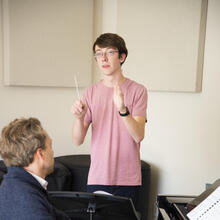Good mental health is achieved through many habits like a healthy diet, exercise, connecting with others, expressing emotions in constructive ways, and the list goes on. Many of these habits can involve creating or listening to music. Of the many benefits music has on mental health, the most noticeable is the release of stress and emotions.

University of Waterloo Music student Cameron Slipp said, “Playing music has always been a method of stress relief for me. I often find myself noodling away on the piano when I’m stressed - and I’ve been doing that a lot lately because of the pandemic.”
“Music acts as a creative outlet for our emotions, which we often bottle up inside of us,” stated Kayla Burmaster, a Music and Psychology student. “Music can regulate our emotions. It activates the neocortex of the brain which helps calm us and reduce impulsivity.”
Anita Chen, a Math student with a minor in Music, explained that over the past few months she has “improvised and composed a song on the piano to reflect, depict, and let out my pandemic-related emotions.” She continued, “I feel like I am channeling the nuances, conflicts, and states of my emotion into music. Those activities help me to express my feelings beyond words and ultimately make me more resilient.”
Anita and Cameron aren’t the only Waterloo students who use their emotions to inspire the music they create. “For some, it’s easier to express feelings by writing song lyrics or expressing it through the elemental components of the music.” Kayla reflected, “Music is often written about people’s personal experiences and it helps people feel less lonely when they find a song with lyrics that really resonate with their personal situation.”

Music can make a listener feel a multitude of different emotions based on the composer’s intent. Kayla explained further, “Music is proven to reduce stress. However, if you choose to listen to the theme of the popular game-based learning platform Kahoot, you may experience an increase of stress, as the music was specifically designed to create tension.”
“The way that music emotionally resonates with me varies depending on both my mood and the music.” Cameron added, “Music can make me feel calm, but it can also make me feel stressed. Music can make me feel connected, but it can also make me feel alone. I think part of the beauty of music is its power to embody and amplify any emotion.”
The Conrad Grebel University College Music Department at UWaterloo is mindful of the connection between music and mental health. While music ensembles can’t be in person this term, the new virtual format provides students with the opportunity to let out their emotions, connect with others, and create music together, all which will help improve mental health.
In addition, UWaterloo’s Thrive program brings attention to the importance of “building positive mental health.” Thrive week is held the first week of November and includes events about simple mindful cooking, managing stress as a university student, and “Noondaagochige,” a virtual Noon Hour Concert presented by Grebel. On November 4, saxophonist Olivia Shortt will share her new music pieces as well as those of artists she’s met over the past few years.

Though it is not being released during Thrive week, Grebel will release a Noon Hour Concert on November 25 called “Music for Self-Isolation.” Guitarist Mariette Stephenson will play some pieces by composer Frank Horvat. While at home, Frank was struggling to figure out how to share his music since people can’t come together and play music. He came up with a solution and has written 31 solos and duets for every type of musician to enjoy in their own home. Both Horvat and Stephenson, though performing and playing alone, are still using their music to build community and stay connected with others.
“The pandemic makes me realize how music-making can contribute to my resiliency,” Anita added. All of these musicians have become more resilient and improved their mental health by overcoming challenges and negative emotions posed by the pandemic by simply playing and listening to music.
Written by Abby Rudy-Froese